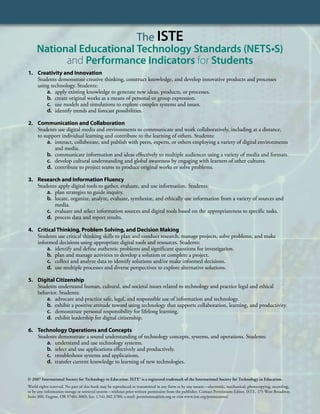Más contenido relacionado La actualidad más candente (14) Similar a Nets for students_2007_standards (20) 1. The ISTE
National Educational Technology Standards (NETS•S)
and Performance Indicators for Students
1. Creativity and Innovation
Students demonstrate creative thinking, construct knowledge, and develop innovative products and processes
using technology. Students:
a. apply existing knowledge to generate new ideas, products, or processes.
b. create original works as a means of personal or group expression.
c. use models and simulations to explore complex systems and issues.
d. identify trends and forecast possibilities.
2. Communication and Collaboration
Students use digital media and environments to communicate and work collaboratively, including at a distance,
to support individual learning and contribute to the learning of others. Students:
a. interact, collaborate, and publish with peers, experts, or others employing a variety of digital environments
and media.
b. communicate information and ideas effectively to multiple audiences using a variety of media and formats.
c. develop cultural understanding and global awareness by engaging with learners of other cultures.
d. contribute to project teams to produce original works or solve problems.
3. Research and Information Fluency
Students apply digital tools to gather, evaluate, and use information. Students:
a. plan strategies to guide inquiry.
b. locate, organize, analyze, evaluate, synthesize, and ethically use information from a variety of sources and
media.
c. evaluate and select information sources and digital tools based on the appropriateness to specific tasks.
d. process data and report results.
4. Critical Thinking, Problem Solving, and Decision Making
Students use critical thinking skills to plan and conduct research, manage projects, solve problems, and make
informed decisions using appropriate digital tools and resources. Students:
a. identify and define authentic problems and significant questions for investigation.
b. plan and manage activities to develop a solution or complete a project.
c. collect and analyze data to identify solutions and/or make informed decisions.
d. use multiple processes and diverse perspectives to explore alternative solutions.
5. Digital Citizenship
Students understand human, cultural, and societal issues related to technology and practice legal and ethical
behavior. Students:
a. advocate and practice safe, legal, and responsible use of information and technology.
b. exhibit a positive attitude toward using technology that supports collaboration, learning, and productivity.
c. demonstrate personal responsibility for lifelong learning.
d. exhibit leadership for digital citizenship.
6. Technology Operations and Concepts
Students demonstrate a sound understanding of technology concepts, systems, and operations. Students:
a. understand and use technology systems.
b. select and use applications effectively and productively.
c. troubleshoot systems and applications.
d. transfer current knowledge to learning of new technologies.
© 2007 International Society for Technology in Education. ISTE® is a registered trademark of the International Society for Technology in Education.
World rights reserved. No part of this book may be reproduced or transmitted in any form or by any means—electronic, mechanical, photocopying, recording,
or by any information storage or retrieval system—without prior written permission from the publisher. Contact Permissions Editor, ISTE, 175 West Broadway,
Suite 300, Eugene, OR 97401-3003; fax: 1.541.302.3780; e-mail: permissions@iste.org or visit www.iste.org/permissions/.
